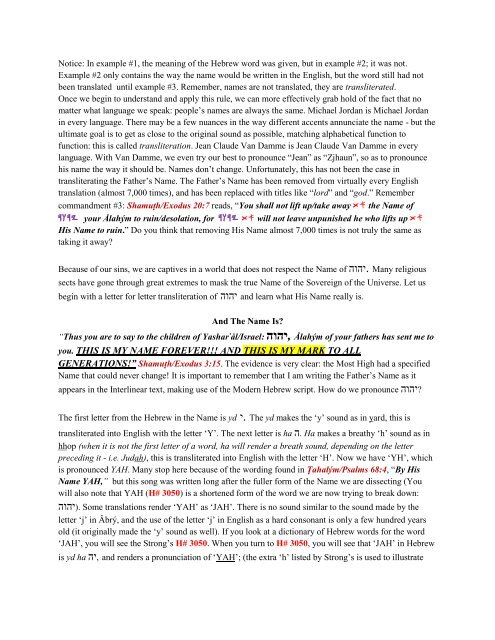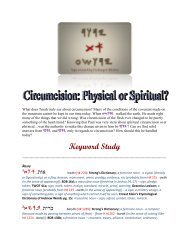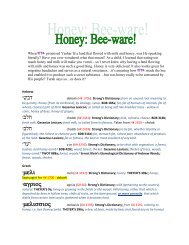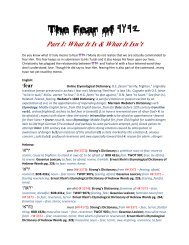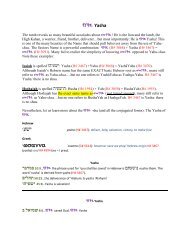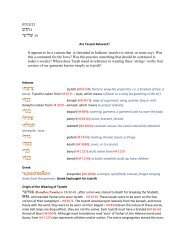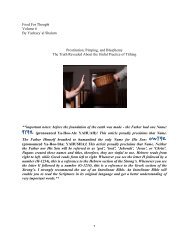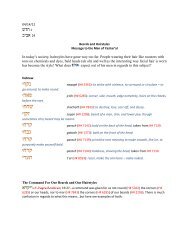What's In a Name? - Yahuah Is Life
What's In a Name? - Yahuah Is Life
What's In a Name? - Yahuah Is Life
Create successful ePaper yourself
Turn your PDF publications into a flip-book with our unique Google optimized e-Paper software.
Notice: <strong>In</strong> example #1, the meaning of the Hebrew word was given, but in example #2; it was not.<br />
Example #2 only contains the way the name would be written in the English, but the word still had not<br />
been translated until example #3. Remember, names are not translated, they are transliterated.<br />
Once we begin to understand and apply this rule, we can more effectively grab hold of the fact that no<br />
matter what language we speak: people’s names are always the same. Michael Jordan is Michael Jordan<br />
in every language. There may be a few nuances in the way different accents annunciate the name - but the<br />
ultimate goal is to get as close to the original sound as possible, matching alphabetical function to<br />
function: this is called transliteration. Jean Claude Van Damme is Jean Claude Van Damme in every<br />
language. With Van Damme, we even try our best to pronounce “Jean” as “Zjhaun”, so as to pronounce<br />
his name the way it should be. <strong>Name</strong>s don’t change. Unfortunately, this has not been the case in<br />
transliterating the Father’s <strong>Name</strong>. The Father’s <strong>Name</strong> has been removed from virtually every English<br />
translation (almost 7,000 times), and has been replaced with titles like “lord” and “god.” Remember<br />
commandment #3: Shamuṭh/Exodus 20:7 reads, “You shall not lift up/take away ta the <strong>Name</strong> of<br />
hwhy your Ålahým to ruin/desolation, for hwhy ta will not leave unpunished he who lifts up ta<br />
His <strong>Name</strong> to ruin.” Do you think that removing His <strong>Name</strong> almost 7,000 times is not truly the same as<br />
taking it away<br />
Because of our sins, we are captives in a world that does not respect the <strong>Name</strong> of .יהוה Many religious<br />
sects have gone through great extremes to mask the true <strong>Name</strong> of the Sovereign of the Universe. Let us<br />
begin with a letter for letter transliteration of יהוה and learn what His <strong>Name</strong> really is.<br />
And The <strong>Name</strong> <strong>Is</strong><br />
“Thus you are to say to the children of Yashar῾ål/<strong>Is</strong>rael: ,יהוה Ålahým of your fathers has sent me to<br />
you. THIS IS MY NAME FOREVER!!! AND THIS IS MY MARK TO ALL<br />
GENERATIONS!” Shamuṭh/Exodus 3:15. The evidence is very clear: the Most High had a specified<br />
<strong>Name</strong> that could never change! It is important to remember that I am writing the Father’s <strong>Name</strong> as it<br />
יהוה appears in the <strong>In</strong>terlinear text, making use of the Modern Hebrew script. How do we pronounce<br />
The first letter from the Hebrew in the <strong>Name</strong> is yd .י The yd makes the ‘y’ sound as in yard, this is<br />
transliterated into English with the letter ‘Y’. The next letter is ha .ה Ha makes a breathy ‘h’ sound as in<br />
hhop (when it is not the first letter of a word, ha will render a breath sound, depending on the letter<br />
preceding it - i.e. Judah), this is transliterated into English with the letter ‘H’. Now we have ‘YH’, which<br />
is pronounced YAH. Many stop here because of the wording found in Ṭahalým/Psalms 68:4, “By His<br />
<strong>Name</strong> YAH,” but this song was written long after the fuller form of the <strong>Name</strong> we are dissecting (You<br />
will also note that YAH (H# 3050) is a shortened form of the word we are now trying to break down:<br />
Some translations render ‘YAH’ as ‘JAH’. There is no sound similar to the sound made by the .(יהוה<br />
letter ‘j’ in Âbrý, and the use of the letter ‘j’ in English as a hard consonant is only a few hundred years<br />
old (it originally made the ‘y’ sound as well). If you look at a dictionary of Hebrew words for the word<br />
‘JAH’, you will see the Strong’s H# 3050. When you turn to H# 3050, you will see that ‘JAH’ in Hebrew<br />
is yd ha ,יה and renders a pronunciation of ‘YAH’; (the extra ‘h’ listed by Strong’s is used to illustrate


